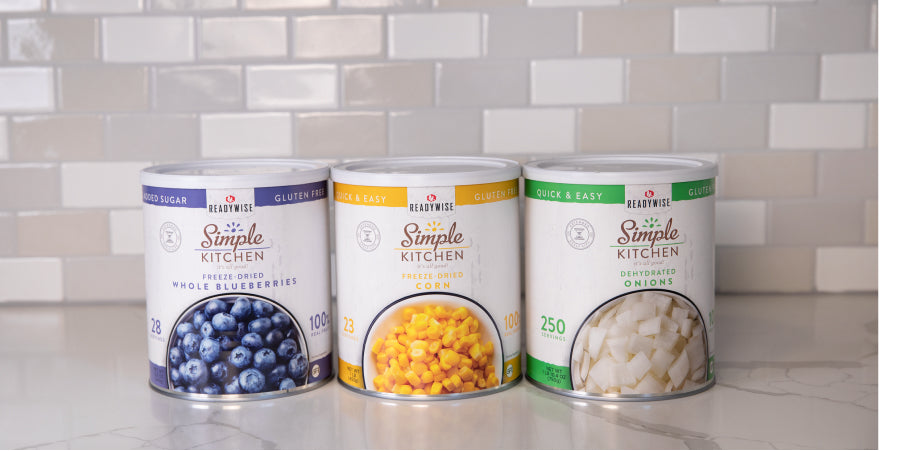Orders over $99

Where to Buy Prepper Food: A Comprehensive Guide for Emergency Preparedness
Table of Contents
Introduction
Preparing for unforeseen emergencies is crucial, and one essential aspect of emergency preparedness is having an adequate supply of emergency food. Whether you're planning for natural disasters, power outages, or any unexpected events, having a well-stocked pantry can provide peace of mind. In this article, we will explore the best places to buy prepper food, ensuring that you have access to high-quality and long-lasting supplies when you need them the most.
Where to Buy Prepper Food: Top Recommendations
When it comes to purchasing emergency food, it's important to consider factors such as quality, shelf life, variety, and convenience. Here are some excellent options for acquiring prepper food supplies:
-
Local Grocery Stores:
- Visit larger grocery stores in your area that have a wide selection of non-perishable food items.
- Look for canned goods, dried fruits, nuts, rice, pasta, and other long-lasting products that can sustain you during emergencies.
- Don't forget to check the expiry dates to ensure you're buying fresh supplies.
-
Online Retailers:
- Explore online platforms such as Amazon, Walmart, and Thrive Market for a vast range of prepper food options.
- Benefit from the convenience of doorstep delivery and the ability to compare prices and read customer reviews.
- Look for reputable brands specializing in emergency food kits or individual items that suit your dietary preferences.
-
Specialty Preparedness Stores:
- Consider visiting specialty stores that focus on emergency preparedness supplies, such as Good Neighbor. Good Neighbor offers dehydrated and freeze-dried meals, beverages, and snacks with delicious shelf-stable ingredients.
- These stores often carry a wide range of long-term food storage options, including freeze-dried meals, MREs (Meals Ready to Eat), and dehydrated foods.
- They may also offer specialized advice on building an emergency kit tailored to your needs.
-
Farmers' Markets and Local Farms:
- Explore your local farmers' markets or connect directly with nearby farms to source fresh produce and other food items.
- Supporting local producers not only ensures a sustainable supply chain but also offers you access to organic and locally-sourced food options.
FAQs about Buying Prepper Food
Q: What is the shelf life of prepper food?
A: The shelf life of prepper food varies depending on the type of food and packaging. Generally, canned goods can last for several years, while freeze-dried or dehydrated foods can have a shelf life of 25 years or more.
Q: How much prepper food should I buy?
A: It is recommended to stockpile at least a two-week supply of prepper food per person in your household. Consider factors such as family size, dietary restrictions, and any specific medical needs.
Q: Are there pre-made emergency food kits or do I need to make my own?
A: You can certainly put together your own food supply, but we do love pre-made kits for their convenience. We’re partial to the Hanson P72 that is designed to support one person for 72 hours with food, water, medical, and survival supplies, all stored in a crushproof case. Other types of kits such as the Readywise 7-Day Breakfast & Entrée Dry Bag provide several days worth of food in a dry-bag that’s easy to grab and go.

Q: Are there any dietary options available for prepper food?
A: Yes, there are various dietary options available for prepper food, including gluten-free, vegetarian, and vegan choices. Ensure you read product labels or inquire with suppliers to find suitable options for your specific needs.
Q: Should I rotate my prepper food stock?
A: Yes, rotating your prepper food stock is essential to ensure freshness. Monitor expiration dates regularly and consume and replace food items nearing their expiry.
Q: Can I make my own prepper food?
A: Absolutely! Making your own prepper food allows you to have control over ingredients and taste preferences. Consider canning, dehydrating, or vacuum-sealing foods for long-term storage.
Q: What else do I need in addition to emergency food?
A: Our “The 72 Hour Survival Kit Backpacks to Consider for Your Family” post is a great resource for other items to include in an emergency kit. Ready.gov also provides great emergency planning resources and lists.
Conclusion
Knowing where to buy prepper food is vital for building a reliable emergency preparedness kit. Local grocery stores, online retailers, specialty preparedness stores, and farmers' markets are excellent sources for acquiring prepper food supplies. Remember to consider factors such as quality, shelf life, variety, and convenience when making your purchase. By stocking up on high-quality prepper food, you can ensure the well-being of yourself and your loved ones during unexpected emergencies. Stay prepared, stay safe!

